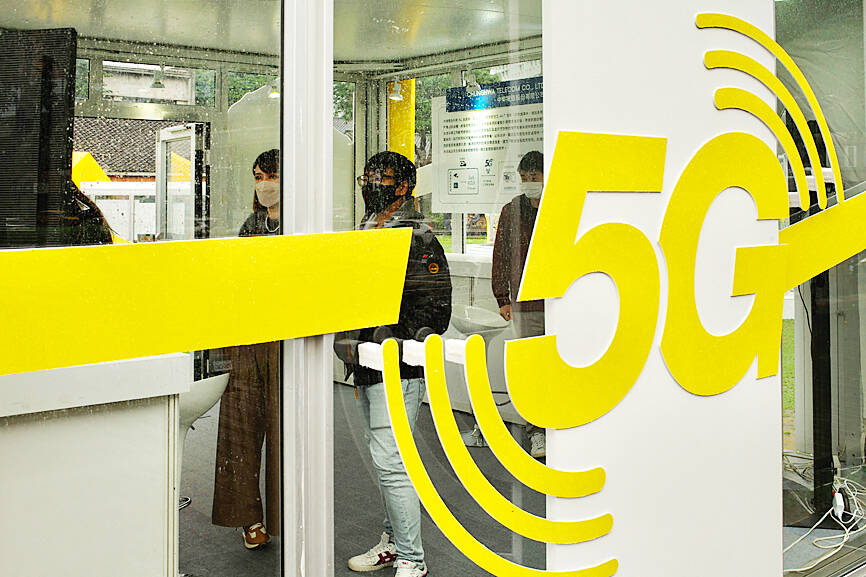Taiwan’s 5G mobile network market is extremely dynamic with fierce competition, but the Mobile Experience Awards were dominated by three of the five national operators, Opensignal said in its report for this month.
Opensignal is a UK-based mobile analytics company that specializes in analyzing the consumer mobile experience.
Chunghwa Telecom Co (中華電信) won all four of the speed categories: Download Speed Experience, Upload Speed Experience, 5G Download Speed and 5G Upload Speed. Of the four, it retained three from the last report, and replaced Far EasTone Telecommunications Co (遠傳電信) as the winner of the Upload Speed Experience category due to its a 1.8 megabits per second (Mbps), or 14.7 percent, increase in overall upload speed, Opensignal’s Taiwan Mobile Network Experience Report said.

Photo: Sam Yeh, AFP
The operator won the 5G Download Speed award for the third time in a row, with a speed of 374.1Mbps, which was 102.9Mbps, or 37.9 percent, faster than second-placed Far EasTone’s 271.2 Mbps.
Taiwan Mobile Co (台灣大哥大) was the outright winner of the Games Experience award, and tied first with Chunghwa Telecom for the Video Experience award, Voice App Experience, 5G Video Experience, 5G Games Experience and 5G Voice App Experience awards.
Taiwan Mobile also won both awards for consistent quality.
Far EasTone once again won the 5G Availability award, as 5G users spent the largest proportion of their time on its network with an active 5G connection of 33.8 percent. Chunghwa Telecom placed second with 30.6 percent.
As a result, Far EasTone’s lead shrank compared with last report, when it won with 38.7 percent, the report said.
Taiwan’s five operators also include Taiwan Star Telecom Corp (台灣之星) and Asia Pacific Telecom Co (亞太電信).

Vincent Wei led fellow Singaporean farmers around an empty Malaysian plot, laying out plans for a greenhouse and rows of leafy vegetables. What he pitched was not just space for crops, but a lifeline for growers struggling to make ends meet in a city-state with high prices and little vacant land. The future agriculture hub is part of a joint special economic zone launched last year by the two neighbors, expected to cost US$123 million and produce 10,000 tonnes of fresh produce annually. It is attracting Singaporean farmers with promises of cheaper land, labor and energy just over the border.

US actor Matthew McConaughey has filed recordings of his image and voice with US patent authorities to protect them from unauthorized usage by artificial intelligence (AI) platforms, a representative said earlier this week. Several video clips and audio recordings were registered by the commercial arm of the Just Keep Livin’ Foundation, a non-profit created by the Oscar-winning actor and his wife, Camila, according to the US Patent and Trademark Office database. Many artists are increasingly concerned about the uncontrolled use of their image via generative AI since the rollout of ChatGPT and other AI-powered tools. Several US states have adopted

KEEPING UP: The acquisition of a cleanroom in Taiwan would enable Micron to increase production in a market where demand continues to outpace supply, a Micron official said Micron Technology Inc has signed a letter of intent to buy a fabrication site in Taiwan from Powerchip Semiconductor Manufacturing Corp (力積電) for US$1.8 billion to expand its production of memory chips. Micron would take control of the P5 site in Miaoli County’s Tongluo Township (銅鑼) and plans to ramp up DRAM production in phases after the transaction closes in the second quarter, the company said in a statement on Saturday. The acquisition includes an existing 12 inch fab cleanroom of 27,871m2 and would further position Micron to address growing global demand for memory solutions, the company said. Micron expects the transaction to

A proposed billionaires’ tax in California has ignited a political uproar in Silicon Valley, with tech titans threatening to leave the state while California Governor Gavin Newsom of the Democratic Party maneuvers to defeat a levy that he fears would lead to an exodus of wealth. A technology mecca, California has more billionaires than any other US state — a few hundred, by some estimates. About half its personal income tax revenue, a financial backbone in the nearly US$350 billion budget, comes from the top 1 percent of earners. A large healthcare union is attempting to place a proposal before